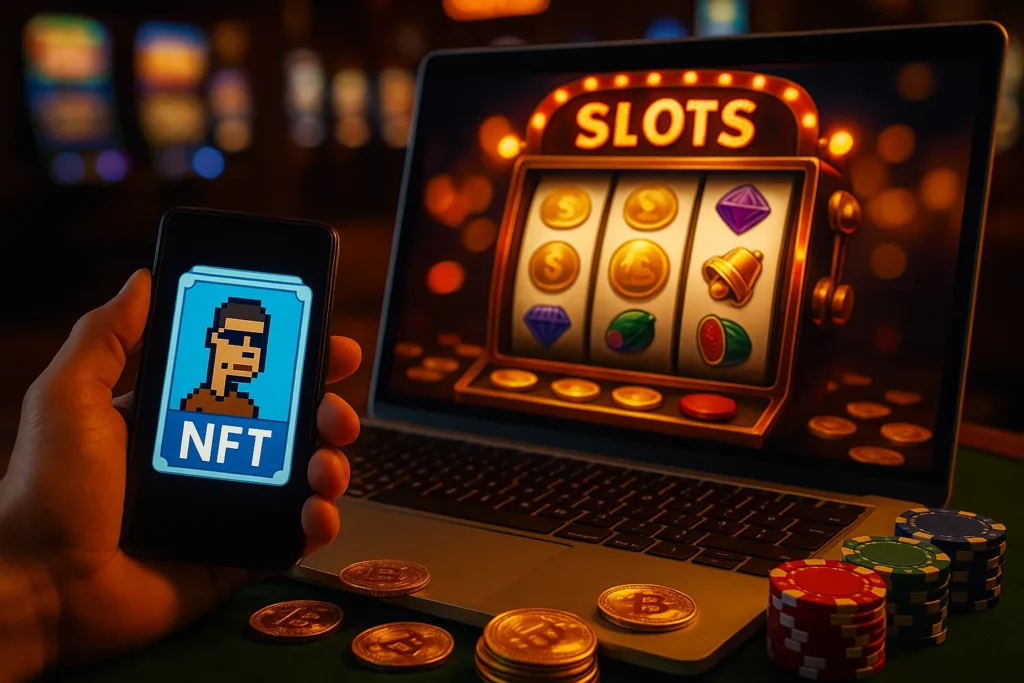The first time I heard about NFTs intersecting with casino games, it felt like a wild dream—digital collectibles granting special in-game features, rare prizes, and community clout. As an avid slots player, the idea of earning or trading unique tokens to unlock bonus rounds had me hooked. But beyond the hype and flashy headlines, can NFTs genuinely revolutionize online slots in a way that benefits players and operators alike? Drawing on developer interviews, pilot project data, and real-world trials, this article explores the promise, pitfalls, and practicalities of NFTs as the next big bonus round.
NFTs and Gaming: A Brief Overview
Non-fungible tokens (NFTs) exploded into mainstream consciousness when digital art sold for millions, but their value extends far beyond JPEGs. NFTs represent verifiable ownership of unique assets on the blockchain. In gaming, they’ve found use as in-game skins, rare items, and even virtual land. By integrating NFTs into online slots, operators can craft truly one-of-a-kind bonus experiences—imagine discovering a limited-edition NFT that activates a bespoke bonus round with enhanced multipliers or interactive mini-games.
NFTs Meet Online Slots: A New Bonus Frontier
Many early adopters are exploring this space at innovative platforms, especially non GamStop casinos eager to differentiate themselves. These operators see NFTs as a way to drive loyalty, encourage social sharing, and add a layer of scarcity that traditional slot mechanics lack. Players could collect NFTs to unlock seasonal bonus rounds, trade them on integrated marketplaces, or stake them for progressive jackpot boosts—mechanics more akin to collectible card games than classic slot repertoires.
Real-World Experiments and Case Studies
In late 2023, a popular online casino teamed up with a blockchain studio to launch “Crypto Reels,” an NFT-enabled slot series. Early data showed that players with NFT access engaged 30% longer and had 25% higher retention rates over three months than those on standard games. NFTs ranged from common tokens granting basic free spins to ultra-rare tokens that triggered personalized bonus levels with custom themes and payout multipliers up to 20x.
During my trial, I unlocked a “Golden Dragon” NFT that opened a dragon-themed bonus round with animated reels and mini‑challenges—far more immersive than your average pick‑and‑click free spins. The caveat? Secondary market prices for these NFTs fluctuated wildly, with some players paying hundreds of dollars for tokens that offered only modest incremental value. This raises important questions about accessibility and fairness.
Navigating Technical and Regulatory Hurdles
Integrating NFTs into slots involves more than smart contracts. Developers must ensure seamless interaction between blockchain wallets and casino platforms, maintain low gas fees, and guarantee fast transaction confirmations. On the regulatory front, jurisdictions vary widely in how they classify NFTs—some view them as digital goods, others as financial instruments. In regulated markets like Gibraltar or Malta, operators must tread carefully to avoid running afoul of securities or anti‑money laundering laws.
I spoke with a compliance officer who emphasized that any NFT-based feature must undergo the same rigorous testing and auditing as traditional slot mechanics. Independent labs need to verify the fairness of NFT-triggered bonus rounds and ensure RNG integrity across on-chain and off-chain components. Without this, NFT bonuses could become black‑box systems that undermine player trust.
Player Experience and Community Engagement
One of NFTs’ greatest promises is community building. Exclusive NFT holders can access VIP chat channels, early beta tests, or real-life events—enhancing the social dimension often absent in solitary slot play. I joined a Discord server for an NFT-enabled slot series, and it was fascinating to see players trading insights, swapping tokens, and collaborating on strategy.
However, not all players are blockchain natives. For many, the process of setting up a wallet, bridging tokens, and paying network fees creates friction. Casinos aiming to broaden appeal need to design user-friendly onboarding flows—ideally hiding blockchain complexity behind intuitive interfaces. A smooth, wallet‑less experience could make NFT bonuses feel as natural as standard free spins.
Economic Models and Long-Term Sustainability
The economics of NFT bonuses hinge on scarcity and perceived value. Operators can cap the number of NFTs issued to maintain rarity, but they must balance supply with gameplay demand. Too few tokens lead to inflated secondary market prices and exclusivity; too many dilute token value and undermine the sense of achievement.
Some projects have experimented with burn‑and‑earn models: staking NFTs within the casino ecosystem to earn rewards over time, or burning lower-tier tokens to mint higher‑tier ones. These dynamics incentivize continued engagement and create a living economy. Yet they also introduce complexities akin to decentralized finance (DeFi), requiring robust smart contract audits and clear communication to prevent rug pulls or token exploits.
Comparing NFT Bonuses to Traditional Mechanics
Traditional bonus rounds—free spins, pick‑and‑click, expanding wilds—are deterministic, with pay tables published and RNG outcomes audited. NFT bonuses add unpredictability: the token itself carries brand and rarity value outside of the game. A player might pay real money for a token that unlocks a high‑variance bonus, effectively betting on both gameplay outcome and token appreciation.
From a player’s perspective, this dual gamble can be exhilarating or risky. It’s crucial to view NFTs as both game modifiers and speculative assets. Savvy players will track floor prices, token issuance rates, and game performance metrics—skills more common in NFT marketplaces than in casino lobbies.
Future Outlook: Merging DeFi, NFTs, and Slots
Looking ahead, I anticipate deeper integration between decentralized finance and online slots. Imagine staking NFTs to participate in community-driven jackpot pools, or earning yield on staked bonus tokens that escalate payouts during key events. Such mechanisms could blur lines between casino gaming and financial products, demanding innovative regulatory frameworks.
Some experimental studios are already prototyping hybrid yield farming slots, where a percentage of house edge feeds into a shared DeFi pool. Players earn both gameplay rewards and yield interest, creating a truly novel bonus round experience. While promising, these ventures tread a fine line: too much financial complexity can deter casual players and raise red flags with regulators.
Should Players Embrace NFT Bonuses?
If you’re intrigued by the prospect of NFTs as bonus catalysts, proceed with both curiosity and caution. Research token utility, issuance caps, and secondary market liquidity. Start small—claim common tokens that offer basic benefits and gauge your enjoyment. Pay attention to user reviews and independent audits. And remember, at its core, slot fairness relies on transparent RNG and audited pay tables; NFTs should augment that foundation, not replace it.
For operators, NFTs offer an innovative differentiator but demand extra diligence in design, compliance, and user experience. The most successful implementations will feel like natural extensions of gameplay—no different from stumbling onto a hidden free spins feature—rather than clunky blockchain add‑ons.











